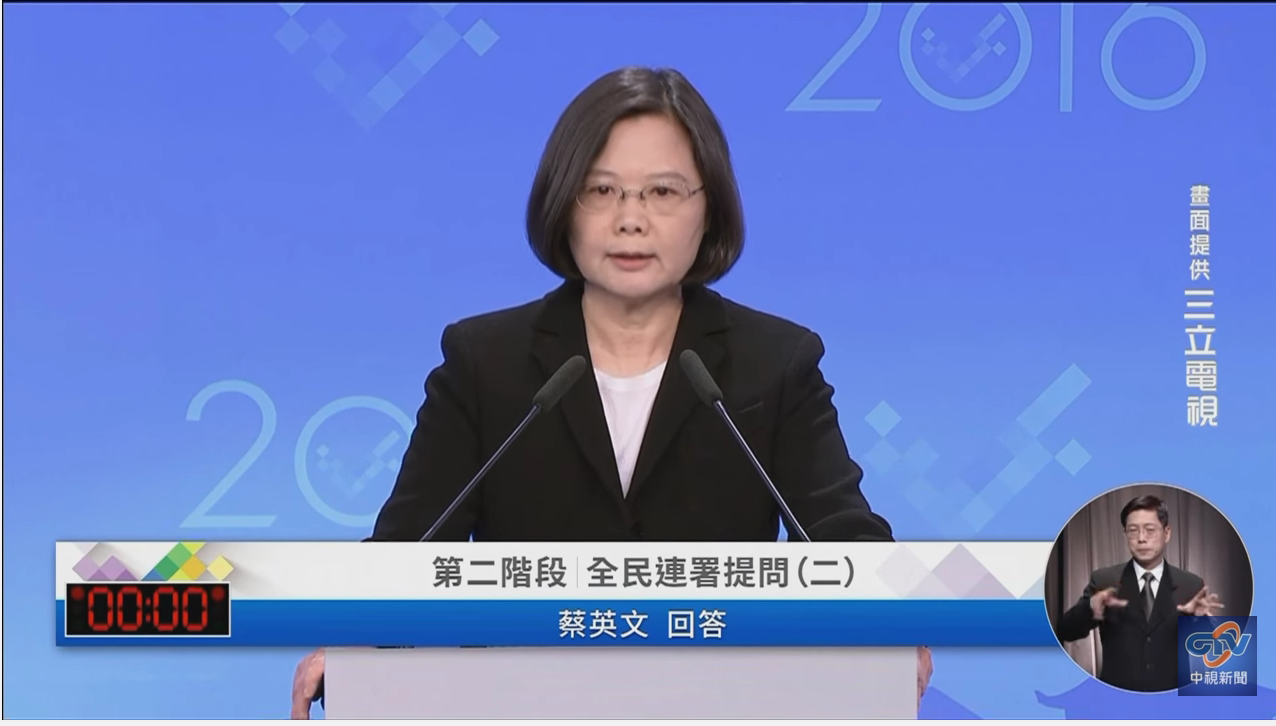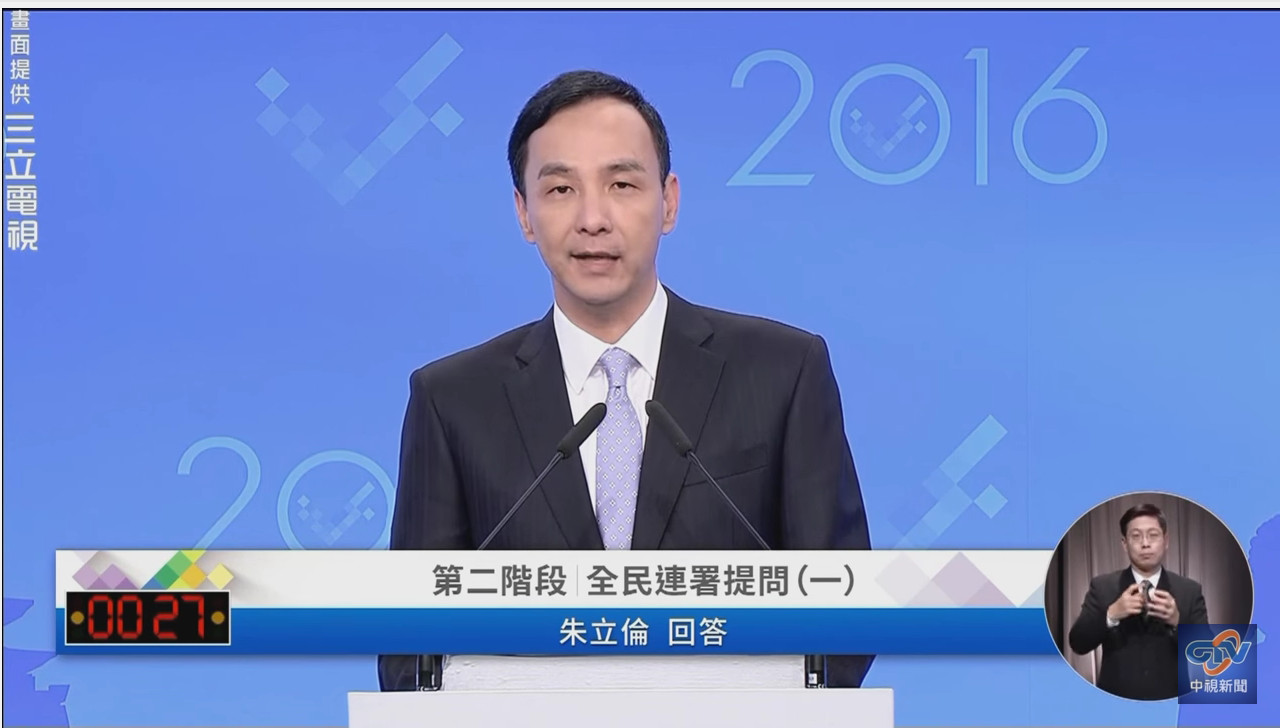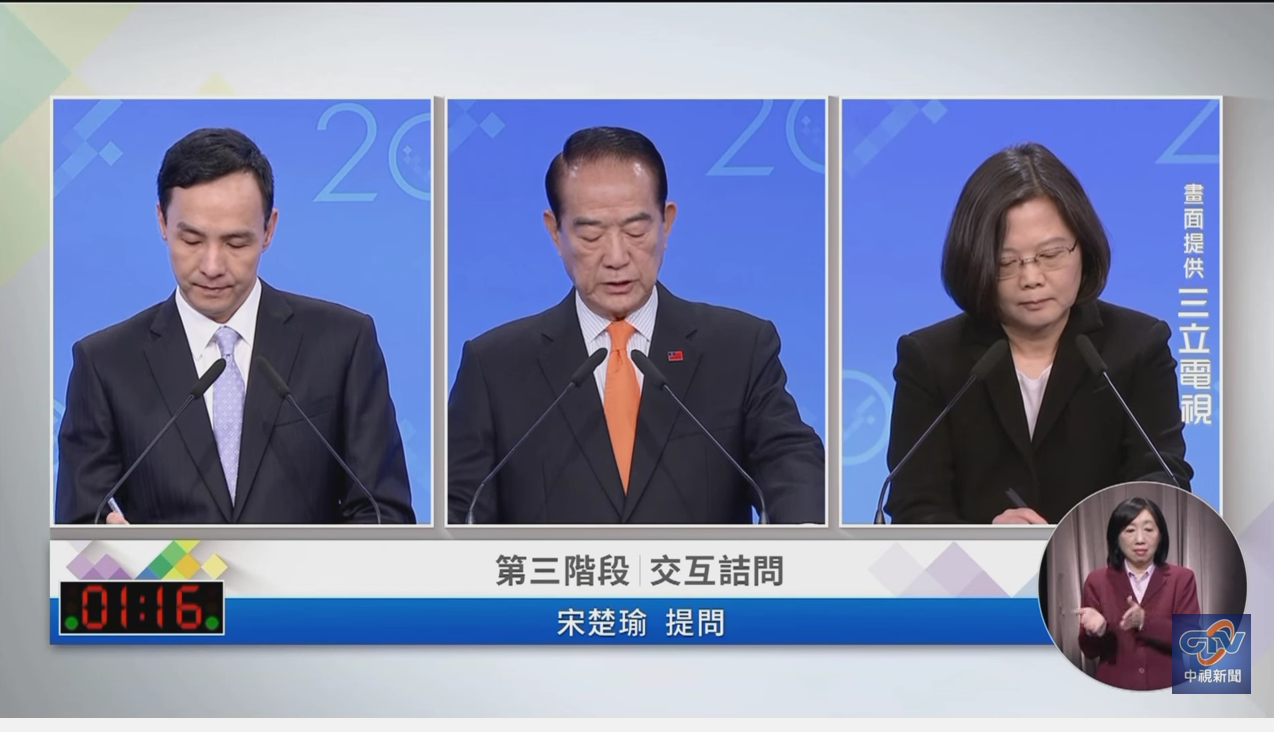by Brian Hioe
語言:
English
Photo Credit: CTV
THE SECOND Taiwanese presidential debate took place on Saturday, January 2nd 2016, with Eric Chu, Tsai Ing-Wen, and James Soong once again squaring off, less than two weeks before elections. But, as with the first presidential debate, the occasion was largely an occasion for grandstanding and attacks. Given that a Tsai presidential victory seems all but certain, perhaps it is such that we can understand Chu and Soong’s behavior in the debate.
What is of note to extract from the debate may be that all candidates promised reform measures for Taiwan. In her presentation, Tsai mostly used platitudes that seem drawn from Sunflower-era civil society i.e., referencing social movements such as the anti-nuclear movement or activism around forced land evictions in Dapu, Miaoli, and calling for transitional justice in regards to Taiwan’s past history of authoritarianism. Tsai also used the usual talking points of civil society in attacking the KMT, i.e., vote buying by the KMT, the issue of the KMT’s assets, and collusion with Taiwanese business interests who do business in China as a means to erode at Taiwan’s sovereignty.
 Photo credit: CTV
Photo credit: CTV
It is probably that Tsai hopes to create the perception for her first term that Tsai was voted into office on the basis of the demand for reform, this demand coming from young people who previously did not pay attention to political matters. Tsai is clearly targeting young people—but also, importantly, hoping to give the impression to older voters that Tsai has the youth vote in order to influence their political decision-making.
As we see in her debate presentation and recent campaign ads, in order to secure as much breathing room for policy changes as possible, probably Tsai is hoping to depict her eventual victory as the beginning of a new era. Indeed, during the last debate, Tsai was criticized for an abstractness to her presentation, with less focus on concrete policy, and more focus on a utopian vision. This was also true of this debate, although there was more focus on concrete calls for reform.
Thus, we may view Chu and Soong’s debate presentations as fundamentally responsive in nature to Tsai, although during the debate itself both presented before Tsai. Neither will be president of Taiwan in 2016. Thus, it is interesting that both Chu and Soong claimed support for reform measures, with all agreeing on the need to improve Taiwan’s Internet infrastructure, the need for judicial reform, and pledging to improve Taiwan’s economic growth.
It may be funny to note that Chu, Soong, and Tsai all agreed on the need to improve Taiwan’s infrastructure and judicial reform, but there was greater contestation about what measures needed to be taken to improve economic growth. There was some back and forth between candidates regarding which trade deals Taiwan needs to sign and the conditions attached to trade deals, regarding the food safety of imported food products and free trade agreements which include China. Chu in particular raised Tsai’s opposition to RCEP, which includes China. But between the fact that all candidates were strangely supportive of calls for reform probably gestures towards that the present is, in fact, perceived as an era of hope and change and not even the KMT or PFP wish to appear as if they would go against the wave of calls for political reform—of course, never mind that the KMT and PFP and their ilk are precisely the obstacles to change in Taiwan.
 Photo credit: CTV
Photo credit: CTV
It is such that Tsai was also notably more aggressive in attacking Chu and Soong during this debate, as compared to last debate. Tsai blatantly called Chu a second Ma Ying-Jeou at one point, though Chu’s repartee was that she was attacking the specter of Ma and avoiding taking Eric Chu in his own right, as well as that she had spent a disproportionate amount of time attacking him rather than speaking of her own policies. As with the previous debate, the 1992 Consensus was used as a sledgehammer against Tsai, but Chu seems to have backed off on this compared to the first debate, given the criticisms of Chu for focusing on this one issue to criticize Tsai after the first debate.
Regardless, Chu and Soong were, in fact, on the defensive. During the debate, particularly near its tail end, Chu and Soong both made attempts to revise their public images. Stretching ludicrousness, Soong tried to depict himself as a participant in the Taiwanese democracy movement, rather than one of its antagonists. One generally wonders as to what Soong was thinking for the course of the debate, given that Soong acted throughout the debate as though he would in fact be the next president of Taiwan when he never had the chance of winning and has run multiple times in the past without the real chance of victory.
As for Chu, Chu attempted to play up that he was an ordinary person, with an ordinary hobbies and an ordinary life history—indeed, apparently this was to try revise the image of Chu as a wealthy beneficiary of KMT family ties. Notably, parroting an old rhetorical strategy of Chen Shui-Bian, both Soong and Chu referred to themselves in the third person during the debate, but Tsai Ing-Wen did not do so. It may be interesting that where the PFP and KMT saw some tension, however.
 Photo credit: CTV
Photo credit: CTV
Indeed, that the PFP was formed by former KMT who saw the party as abandoning its traditional values. At one point, when the conversation turned the topic of KMT party assets, Soong accused the KMT of abandoning the invaluable “party asset” of Sun Yat-Sen’s Three Principles of the People and Tridemism (三民主義). Soong also cited the words of Chiang Ching-Kuo several times as inspirational to him. But this all may just be an indication of how the PFP are is doomed to be consigned the dustbin of history and would eventually be followed suit by the KMT. Both Tsai and Soong also attacked Chu for his attempt to play on people’s emotions by referring to a “Tamsui grandma” who urged him to run for president, Soong asking where this “Tamsui grandma” was and Tsai yoking this to an appeal to Taiwanese civil society in speaking of a “Dapu grandma.”
Nevertheless, going forward, the second presidential debate will probably not have a large impact on voters. In the absence of any real contestation or flare-ups, all three presidential candidates rehearsed their usual talking points. This may be a result of having presidential debates so close to elections, as is practice in Taiwan. So, after the debate, voters will probably vote according to who they would have voted for anyway.


 Photo credit: CTV
Photo credit: CTV Photo credit: CTV
Photo credit: CTV Photo credit: CTV
Photo credit: CTV